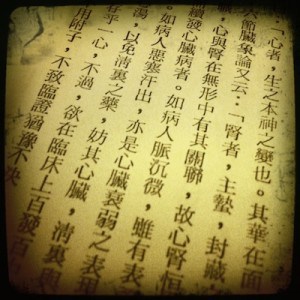Qi is not pronounceable in English. Its whistled aspiration is not a sound found in our language. And much as we can approximate it with the “chee”, as in the beginning of “cheese”, it will forever be a curious transplant; like an exotic ornamental tree from abroad.
 Qi. In English we don’t have anything close to the idea of an overall enlivening force in nature. A connective force that blows clouds across the sky, surges currents through the ocean, directs the growth, blooming and decline of the myriad forms we recognize as Life. We don’t perceive a unified field that directs the beating of your heart and calls the tune on next week’s weather forecast.
Qi. In English we don’t have anything close to the idea of an overall enlivening force in nature. A connective force that blows clouds across the sky, surges currents through the ocean, directs the growth, blooming and decline of the myriad forms we recognize as Life. We don’t perceive a unified field that directs the beating of your heart and calls the tune on next week’s weather forecast.
We don’t really have a word in our language that connects the dots between your wife’s personality, the pungent taste of cinnamon, the character of the oak tree outside your breakfast window and the way snowy grey white days gentle and calm the spirit.
Qi, chee, chih, che, chi, however you wish to represent it in Latinized characters, it basically translates as “vital” or “essential” energy. Which is terribly unsatisfactory to our Western minds, as we tend to prefer Einsteinian equations of abstract proof that all Life is inextricably connected.
Let’s take a look through the Chinese dictionary and glimpse a few of the various manifestations of ? as it is expressed in some common word combinations:
 力氣 li qi- strength
力氣 li qi- strength
天氣 tian qi- weather
生氣 sheng qi- angry
氣色 qi se- complexion
志氣 zhi qi- ambition
不經氣 bu jing qi- economic turndown, recession
淘氣 tao qi- mischievousness
運氣 yun qi- fortune, luck
小氣 xiao qi- miserly and mean spirited
氣短 qi duan- disappointment
語氣 yu qi- verbal attitude
氣死 qi si- infuriate
喘氣 chuan qi- asthmatic breathing
氣骨 qi gu- moral character
客氣 ke qi- politeness
勇氣 yong qi- courage
味氣 wei qi- taste, flavor
Surprising isn’t it, that 氣 shows up in so many places? So when your acupuncturist is working to “regulate your 氣” do not be too surprised if your sleep improves even though she is treating your back pain.
氣 is a profoundly connective force.
